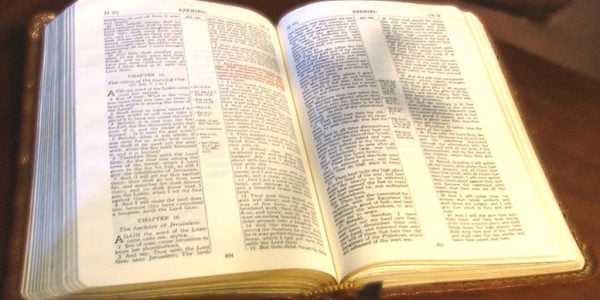
Holiness is one of the most important and controversial aspects of John Wesley’s 300 year old movement that United Methodism is a part of. I think it would be fair and accurate to say that conservative United Methodists cannot accept the legitimacy of gay marriage because of their understanding of holiness. I would further posit that our real debate is about the nature and purpose of holiness. And I would contend that any account of Wesleyan holiness must deal principally with John Wesley’s doctrine of Christian perfection, which should be our explanation of why holiness matters and basis for interpreting scripture pertaining to holiness.
I shared in a recent post that the most definitive book of my evangelical adolescence was Fred Hartley’s Dare To Be Different. In it, Hartley exhorts Christian teenagers to stand out from the culture around them by abstaining from premarital sex, drugs, foul language, and similar adolescent misbehavior. The purpose of holiness in evangelical youth group was for Christians to stand out and be obviously different, so that non-believers would notice that and ask about it, which would give us the opportunity to witness to them.
What I have noticed throughout my time in evangelicalism is that the culture seems to be driven by the anxiety of needing to be different enough than the non-believers around you to know that you really are a full-blown, born-again, biblical Christian. What evangelicalism constantly rails against is lukewarm, nominal Christianity (and not without merit). Real Christians don’t just go to church on Sunday; they study the Bible daily; they meet with other Christians to confess their sins; they pray without ceasing; they aren’t afraid to tell other people about Jesus and about the eternal consequences that are at stake.
In many ways, modern evangelicalism resonates with John Wesley’s exhausting, restless zeal. Wesley hated lukewarm Anglicanism. He wanted people not to be “almost Christian” but “altogether Christian.” He started a movement of zealous piety not to sabotage the Church of England, but to “spread scriptural holiness over the land.” So I can understand how evangelical Methodists would see their movement as entirely analogous to the original Methodist movement. I know Wesleyan Covenant Association leaders are passionate about inspiring spiritual revival in our denomination. I align with their concerns about spiritual lukewarmness, but I’m concerned about the people who get thrown under the bus by their misguided need for particular cultural litmus tests to prove their zeal for revival.
Honestly when I read John Wesley’s writing, some of it is off-putting to me in the way that modern evangelicalism is off-putting because it seems to be zealous about zeal for its own sake, or full of “enthusiasm” in the 18th century sense of the word. But John Wesley’s concept of Christian perfection is a thing of beauty that helps everything about holiness to make sense to me. Christian perfection describes a state of being in which everything we do is guided by love for God and love for neighbor.
In Wesley’s account, the reason to rid ourselves of idols, addictions, and other sinful dispositions is so that we can be fully available to God’s love as perfect vessels of it. So it’s not about following rules for the sake of rule-following. It’s not about proving that we’re really full-blown, born-again, biblical Christian unlike those lukewarm Episcopalians. It’s about experiencing the joy of perfect belonging through our love of God and then spreading that joy to others through our love of neighbor.
If love of God and love of neighbor are the standard, then the way we understand holiness and sin, its opposite, should be framed in terms of what enhances or diminishes that love. My love of God is undermined when I engage in behaviors that block my connection with God like watching pornography, obsessing over my money, boiling with envy against a workplace rival. My love of neighbor is undermined when I treat my neighbor disrespectfully or unjustly and harbor the negative feelings that cause me to behave with injustice and contempt.
On the flip side, John Wesley describes means of grace that enhance our love of God and neighbor, things such as reading the Bible, prayer, worship, acts of service, deeds of justice. The question we should be asking prayerfully about how we spend our time is whether each thing we do is deepening our connection to God’s love or distorting it. Yes, we use the Bible as a guide to help us find our means of grace, but we aren’t just following rules for the sake of rule-following, and our interpretation of scripture happens through a specific lens.
We shouldn’t be asking how we can interpret each verse in whatever way draws the sharpest possible contrast between Christians and secular people, but rather how can each verse guide us into deeper love of God and neighbor. When you interpret the Bible with an agenda of pursuing perfection in love, the meaning is going to be very different than interpreting the Bible with the agenda of proving your distinction from non-believers. A Wesleyan hermeneutic isn’t content with turning scriptures into litmus tests that are controversial and goad secular liberal sensibilities in a satisfying way. Because a Wesleyan hermeneutic wants to know how can I be made more loving by every verse.
That’s why as a Wesleyan, the burden of proof I lay before my traditionalist brothers and sisters is to show why honoring lifelong same-sex intimate partnerships innately undermines love of God or love of neighbor. Idolatry and injustice do undermine love. People straight and gay alike can covet the physical pleasure of sex in a way that undermines the sacramental intimate connection with another creature made in God’s image that allows you to experience God together. I have engaged in sinful, idolatrous sexual behavior and experienced the sabotage of my relationships with God and other people that resulted.
When I look at the honoring of committed same-sex partnerships, I don’t see a “degrading of bodies” that causes people to be “filled with every kind of wickedness, evil, covetousness, malice” (Romans 1:24,29). A truly Wesleyan hermeneutic would be burdened with the need to confirm that the poisonous fruit described in Romans 1:29 is truly representative of all partnered gay people. Because when the goal of biblical interpretation is to gain perfect love, we cannot settle for surface-level proof-texting that is boiled down to a binary pro or anti stance on an issue.
We need to analyze carefully the logic of each scripture passage and the behavioral fruit by which it explains what it’s talking about. Does settling down with a single partner fill a gay person with wickedness, covetousness, and malice? Or does the corruption of wickedness, covetousness, and malice more likely result from debaucherous, adulterous sexual behavior in which already married men are sneaking around having clandestine, haphazard, chaotic intimacies with each other?
If the latter is true, which seems like a plausible interpretation of the Romans 1 passage drawing on its straightforward context clues and basic historical knowledge of first century Roman culture, then legitimizing gay marriage would actually provide a solution for the adulterous, clandestine debauchery Paul rightly condemns, as ironic as that may seem to evangelicals. Why does it have to be impossible that Paul is actually condemning men married to women who cheat with other men, which makes a lot more sense of the abject moral degradation he describes as a result?
The most relevant verse I see in the Bible when thinking about whether gay marriage enhances or sabotages a gay person’s ability to love God richly and fully is 1 Corinthians 7:9: “It is better to marry than to be aflame with passion.” Why can we not consider that gay people who are not uniquely called to celibacy and are disallowed from seeking lifelong partnership might be undermined in their availability to God’s love by distracting passions of lust and loneliness? Paul offers marriage in this case as a concession for a deep human need that he doesn’t personally experience as one called to celibacy. 1 Corinthians 7, the most extensive explicit treatment of Paul’s sexual ethics, is entirely pragmatic.
Why is 1 Corinthians 7:9 forbidden from speaking into our discernment about gay marriage? What if getting married is part of the foundation of emotional security God has gifted to gay people no different than straight people? I know that I myself was a train wreck before God sent me my wife. Part of how he equipped me for ordained ministry was to provide me with a stable marriage. I’ve even had queer students who became Christian because they dated queer Christians in our ministry. Is God not allowed to use same-sex relationships that way in the evangelical universe?
There’s no reason for a Wesleyan using scripture as a guide for finding the way to more perfect love to reject the inclusion of 1 Corinthians 7:9 in a conversation about gay marriage. That’s why I suspect that evangelicals are invested in biblical opposition to homosexuality not because of an agenda-less, holistic Wesleyan analysis of all pertinent scriptures, but because they’re worried that softening their opposition even slightly begins a slippery slope to lukewarmness and ultimately complete secularization. The things that they say about what and who they define themselves against make me confident in that hypothesis.
And let me be clear. It’s not wrong to be zealously loyal to Christ and opposed to lukewarmness. It’s not wrong to be vigilant in our pursuit of scriptural knowledge. What’s wrong is to cheapen holiness by turning it into a set of cultural litmus tests instead of recognizing its holistic beauty as the pursuit of perfect love. It’s not enough to show me two verses in Leviticus, a passage from Romans, and a couple of questionably translated verses in 1 Corinthians 6 and 1 Timothy, all taken out of context and piled together to say only one thing: against.
Explain to me your understanding of how sexual intimacy impacts our perfection in love and have an explanation for why the genders of the partners matter in that regard. And if you can’t demonstrate how queer inclusivity undermines Christian perfection, then being anti-gay has no place in Wesleyan orthodoxy. If your account of holiness is not holistic and practical and built entirely around the goal of being perfected in love, then it isn’t Wesleyan.
Check out my book How Jesus Saves the World From Us: 12 Antidotes To Toxic Christianity!












